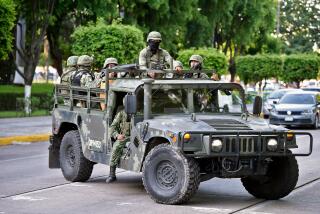COMBAT IN PANAMA : Cancel Drug Summit, Peru Urges Its Latin Neighbors : War on narcotics:The move would signal displeasure over U.S. invasion.
Peru, a key ally in the war on drugs, called Thursday for cancellation of the upcoming Andean summit conference on drugs, a signal that Latin America’s displeasure over the U.S. invasion of Panama has emerged as a serious threat to President Bush’s anti-narcotics campaign.
U.S. drug fighters officially maintained a stiff upper lip, saying that it is too early to speculate about adverse side effects that the U.S. move into Panama may have on their efforts.
But officials worried privately that agents of the Drug Enforcement Administration stationed abroad now may receive less cooperation and access from host countries and that governments like Colombia’s might become more distant.
American intrusion on Latin nations’ sovereignty has been a highly sensitive issue as the United States has strived this year to take the anti-drug fight to the traffickers and producers in their home regions.
In the Administration’s drug strategy, American troops--this week sent to topple Panama’s Manuel A. Noriega--were to play an important role.
Besides Peru, which recalled its ambassador to Washington to underscore its protest, Colombia also denounced the U.S. incursion and refused to recognize U.S.-supported Guillermo Endara as the new president of Panama.
Colombia, the staunchest U.S. ally in the war against violent narcotics traffickers, did not immediately endorse the call to cancel the drug summit that it is scheduled to host Feb. 15--a meeting that President Bush has said he plans to attend.
James Hoobler, an official with the State Department’s Bureau on International Narcotics Matters, said: “We’re proceeding on the assumption that the summit is going to be held. We have no indication that this (Panama move) will affect the war on drugs.”
In fact, William J. Bennett, director of the White House Office of Drug Control Policy, declared that the ouster of Noriega would help the drug campaign because Panama “will no longer serve as a haven or vacation spot for drug traffickers.”
Others were skeptical, however. Never a significant producer or shipping point for drugs, Panama’s major part in the illicit commerce was in the laundering of traffickers’ profits, they said. Even with an honest government in power, that practice is so ingrained in the Panamanian financial community that it will be difficult to curb soon.
Drug policy strategists said they hope a new Panamanian government friendly to the United States might pave the way for a U.S.-Panama treaty that would make it more difficult for the drug cartels to hide their money in Panama.
Such criminal justice agreements, which helped reduce money laundering in Switzerland, the Bahamas and the Cayman Islands, can take years to complete, and Panama’s powerful banking industry could offer serious opposition, one official said.
Noriega, who faces drug-trafficking indictments returned last year by federal grand juries in Miami and Tampa, Fla., is charged with accepting bribes of $10 million from members of Colombia’s Medellin cartel to protect smugglers and cocaine shipments and to launder profits and supply drug laboratories.
In Latin America, the protests by Peru and Colombia joined those previously made by Bolivia, Ecuador, Mexico, Brazil, Venezuela, Guatemala, Argentina and Costa Rica. Only El Salvador, heavily dependent on U.S. support for its battle against leftist guerrillas, said the intervention in Panama was “justifiable.”
In Bogota, Foreign Minister Julio Londono declared: “No country can assume the right to intervene, directly or indirectly, in other state’s affairs, whatever reasons or purposes it may have, much less militarily.”
The Organization of American States, composed of the United States and most of the nations of Latin America and the Caribbean, was moving at its session Thursday toward condemning the invasion but had not worked out the wording of the resolution.
Londono said representatives of several Latin nations plan to meet in Washington over the weekend to study possible solutions to the crisis. A Justice Department source said officials there regard the statements by Latin American leaders to be pro forma.
“I don’t think anyone here believes there is anything but a positive reaction on the drug war from the steps taken in Panama,” the source said.
Con Dougherty, a spokesman for the DEA, said he could offer “no speculation on what might be the effect” of the Panama invasion on such projects as the large U.S.-backed anti-drug mission in the Upper Huallaga Valley of Peru.
“The drug summit meeting is still on the schedule,” he said. “It’s too early to speculate about other things.” The summit was called to intensify and coordinate the multi-pronged assault on traffickers in the Andean nations.
Another Administration official involved in the drug war, while acknowledging concerns, remarked that “the honest answer is it’s too soon to tell” whether the Panama invasion will impede Latin American cooperation.
More to Read
Sign up for Essential California
The most important California stories and recommendations in your inbox every morning.
You may occasionally receive promotional content from the Los Angeles Times.










